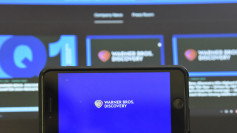Bristol Myers Squibb received U.S. Food and Drug Administration (FDA) approval on Thursday for its groundbreaking schizophrenia treatment, Cobenfy, marking the first novel approach to treating the disorder in over 70 years. Unlike traditional antipsychotic medications that target dopamine receptors, Cobenfy utilizes a combination of xanomeline, which activates muscarinic receptors in the brain, and trospium, which minimizes the gastrointestinal side effects commonly associated with xanomeline.
For decades, schizophrenia treatments have been dominated by medications focused on dopamine receptors, which often come with undesirable side effects such as weight gain, sedation, and movement disorders. Cobenfy represents a significant shift in how the disorder is managed, offering an alternative approach that reduces dopamine activity without these common side effects. The drug has been hailed as a "game changer" by medical experts like Dr. Alan Schatzberg, a psychiatry professor at Stanford University, who noted that Cobenfy could address both the positive and negative symptoms of schizophrenia that many existing treatments fail to fully resolve.
The FDA's approval is based on two successful phase 3 clinical trials that showed patients taking Cobenfy experienced a notable reduction in their Positive and Negative Syndrome Scale (PANSS) scores, which are used to assess the severity of symptoms in individuals with schizophrenia. Over five weeks, patients who took Cobenfy saw a 21-point drop in their PANSS scores compared to a 12-point reduction for those on a placebo. This improvement highlights the drug's potential to significantly enhance the quality of life for people living with schizophrenia, a mental illness that affects roughly 1% of Americans.
"Schizophrenia is a leading cause of disability worldwide," said Tiffany Farchione, director of the Division of Psychiatry at the FDA's Center for Drug Evaluation and Research. "This drug takes the first new approach to schizophrenia treatment in decades. This approval offers a new alternative to the antipsychotic medications people with schizophrenia have previously been prescribed."
Despite its promising potential, Cobenfy is not without risks. The FDA has issued warnings about the drug's use in patients with liver or kidney disease, as it may exacerbate these conditions. Common side effects observed in clinical trials included nausea, vomiting, constipation, high blood pressure, and rapid heartbeat. More severe but less frequent side effects included urinary retention and facial swelling. The FDA recommends caution when prescribing the medication to those with a history of liver impairment due to the potential for liver damage.
Cobenfy's approval is a major milestone for Bristol Myers Squibb, which acquired the drug through its $14 billion purchase of Karuna Therapeutics. The company expects to launch the drug in late October, with a list price of approximately $22,500 per year. Analysts at William Blair project that Cobenfy could generate up to $2.5 billion in U.S. sales by 2030, with potential for even greater revenue if ongoing trials for additional indications, including Alzheimer's-related psychosis, prove successful.
The approval has also lifted investor confidence in Bristol Myers Squibb, as shares of the company surged over 6% following the FDA announcement. The drug's lack of warnings regarding increased mortality in elderly patients-a concern with other antipsychotic medications-has been a particularly positive point for investors and medical professionals alike.
In addition to offering a novel treatment option, Cobenfy's introduction to the market could prompt shifts in how schizophrenia is managed, particularly for patients who have struggled with the side effects of traditional medications. The drug is expected to be widely available to patients under Medicare and Medicaid insurance plans within 12 to 18 months of its launch. Bristol Myers Squibb's Chief Commercialization Officer Adam Lenkowsky has stated that the company aims to ensure rapid access for patients, with significant utilization anticipated by the end of 2025.
The schizophrenia drug market has long been dominated by a handful of major players, but Bristol Myers Squibb is now poised to reshape the landscape. Currently approved treatments include Vanda Pharmaceuticals' Fanapt, AbbVie's Vraylar, and a range of generics such as olanzapine and quetiapine. However, with Cobenfy's unique mechanism of action, it offers a fresh and much-needed option for the millions of people living with schizophrenia worldwide.






